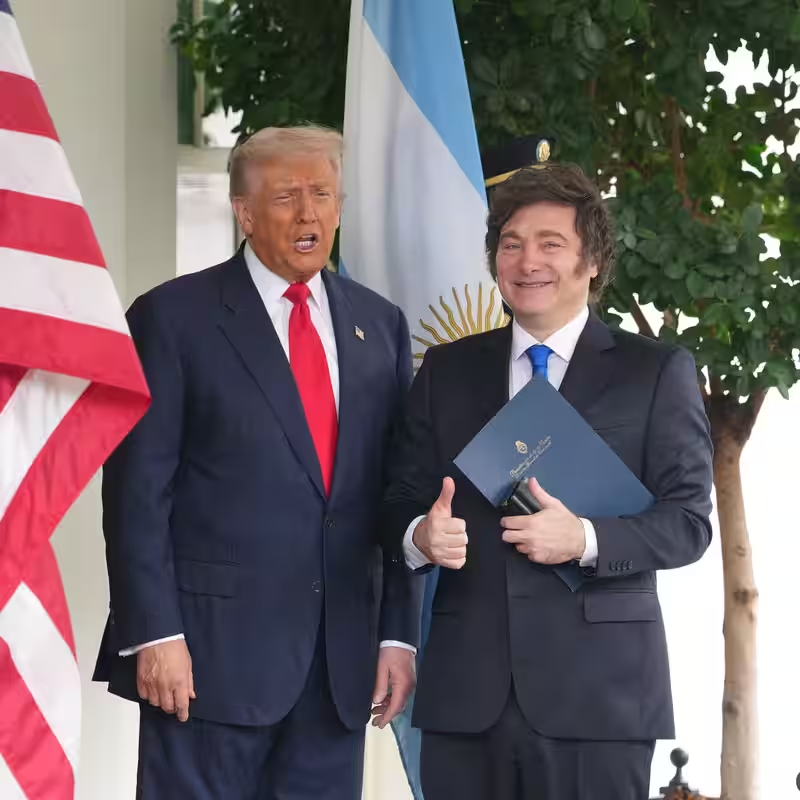Buenos Aires, October 16, 2025 — When Argentina teetered on the brink of economic collapse last month, President Javier Milei turned to his closest international ally: former U.S. President Donald Trump. The response was swift—a $20 billion currency swap to stabilize the peso and restore investor confidence.
But Trump’s lifeline came with strings attached. In a blunt statement during Milei’s White House visit, Trump declared: “If he doesn’t win, we’re gone.” The “he” refers to Milei’s party in Argentina’s upcoming October 26 legislative elections—a condition that has ignited fury at home and raised alarms about foreign interference.
Argentina’s Economic Crisis and the Trump Bailout
Argentina’s economy has been in freefall for months. Despite Milei’s aggressive austerity measures—slashing budgets, freezing public sector wages, and taming inflation—the country’s GDP remains stagnant, and investor trust is fragile.
When a provincial election defeat in September triggered a currency panic, the peso plunged. Fearing a sovereign default, Milei’s government sought emergency help. Enter Trump.
The U.S. Treasury, in a rare move, announced it would purchase billions in Argentine pesos through a currency swap—a financial backstop typically reserved for major trade partners. Argentina, however, accounts for less than 1% of U.S. trade.
“If He Loses, We’re Gone”
Trump’s conditional support stunned observers. At a joint press event, he called Milei his “favorite president” and praised his “MAGA all the way” policies. But then came the ultimatum:
“If he doesn’t win [the election], we’re gone. If he loses, we are not going to be generous with Argentina.”
In Argentina, the remark was met with outrage. Opposition leaders accused Trump of “economic extortion,” while citizens took to social media with hashtags like #NoALaIntervención (No to Intervention). The peso dropped another 5% within hours.
Domestic Fallout in Argentina
Milei’s team scrambled to contain the damage. National Security Minister Patricia Bullrich insisted Trump was speaking “philosophically,” not tying aid to election results. But polls tell a different story:
- Over 60% of Argentines view Trump negatively .
- 42% say they’re less likely to vote for Milei’s party after Trump’s comments.
- Investor confidence has waned despite the bailout.
The Cost of Trump’s Friendship
This isn’t the first time Trump’s support has backfired for an ally. Former Brazilian President Jair Bolsonaro, once hailed by Trump, now faces prison for coup plotting. In Canada and Australia, pro-Trump candidates have consistently lost ground—a trend analysts call the “anti-Trump bump.”
For Milei, the stakes are existential. His party needs to gain seats in Congress to pass further reforms. But Trump’s intervention may have turned his greatest asset—his U.S. alliance—into a liability.
What’s in It for Trump?
Experts say Trump sees Milei as a ideological mirror: a libertarian firebrand attacking “woke leftists” and slashing government. Supporting him aligns with Trump’s vision of reshaping Latin America in his image.
But the move has also drawn criticism in the U.S. Democrats accuse Trump of prioritizing a foreign leader while the U.S. government remains partially shut down. American farmers are also angry—China has shifted soybean purchases from U.S. farms to Argentina, worsening rural economic pain.
| Key Elements of the U.S.-Argentina Deal | Details |
|---|---|
| Bailout Amount | $20 billion currency swap |
| Conditionality | Tied (implicitly) to Milei’s legislative election performance |
| U.S. Trade with Argentina | Less than 1% of total U.S. trade volume |
| Election Date | October 26, 2025 |
[INTERNAL_LINK:Latin-America-Politics] is increasingly shaped by U.S. influence—but as Argentina shows, that influence can cut both ways.




